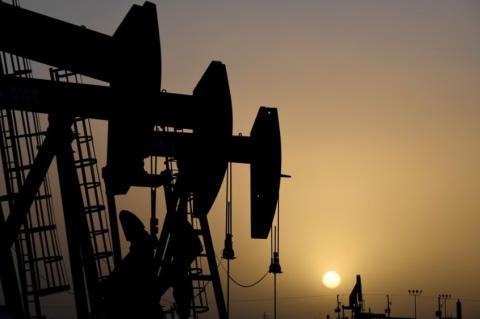
RIYADH: Oil prices fell sharply on Wednesday as Russian oil shipments via the Druzhba pipeline to Hungary restarted, prompting the reversal of earlier gains following an attack on an oil tanker off the coast of Oman.
Brent crude futures fell $1.88, or 2 percent, to $91.98 a barrel by 1418 GMT, and US West Texas Intermediate crude futures slid $2.29, or 2.6 percent, to $84.63 a barrel.
Both benchmarks rose sharply earlier in the session after a tanker was hit off the coast of Oman on Tuesday, sustaining minor damage, highlighting the geopolitical risks in the world’s busiest routes for oil shipments.
Three maritime sources told Reuters that a drone was suspected to have attacked the tanker. An Israeli official said Iran was responsible for the attack, using a Shahed-136 drone, the type it has been supplying to Russia for use in Ukraine.
Prices then retreated after Hungarian Foreign Minister Peter Szijjarto said on Wednesday that flows through the Druzhba pipeline which carries Russian oil to Hungary had resumed following a brief outage.
Indonesia proposes to Canada setting up OPEC-like group for nickel
Indonesia, in talks with Canada, has proposed establishing an Organization of the Petroleum Exporting Countries-like organization for nickel producing countries, the Southeast Asian nation’s investment ministry said in a statement on Wednesday.
Indonesia and Canada are the first and sixth biggest nickel producers in the world, respectively.
The proposal was made when Indonesia"s Investment Minister Bahlil Lahadalia met Canada’s International Trade Minister Mary Ng on Tuesday on the sidelines of the G20 summit in Bali.
The minister raised the prospect of trying to “coordinate and integrate nickel policy” like the OPEC, the group of 13 oil-producing nations that often determine global output, the statement said.
Bahlil previously raised the idea of such a grouping in an interview with the Financial Times last month, though at the time he said Indonesia was still formulating a structure and had yet to approach other nickel producers.
In Wednesday’s statement, Bahlil said a group of nickel producing countries could make sure that they get an optimal return from the electric vehicle industry, accusing countries where EVs are made of conducting protectionist trade policies.
“Through this collaboration, we hope that all nickel producing countries can benefit an evenly distributed value addition,” Bahlil said.
Ng said, in the statement, the two countries could explore such collaboration and that both shared a vision on optimizing natural resources in a sustainable way.
Indonesia is keen to utilize its nickel reserves to attract investment into metal processing and further down in the supply chain, including producing EV batteries and manufacturing EVs in the country.
Global dividends hit record fueled by high oil prices
Stock dividends hit a global record in the third quarter of as oil firms flush with cash due to high crude prices rewarded investors, a report said Wednesday.
Shareholders received $415.9 billion in dividends during the July-September period, asset management fund Janus Henderson said.
The seven percent increase in overall payments to shareholders was largely driven by payments made by oil firms, which jumped by 75 percent from the previous year to $46.4 billion.
Janus Henderson said that without the increase by oil firms overall third quarter dividends would have remained stable from 2021.
With the surge in energy prices following Russia"s invasion of Ukraine in February, oil and gas companies earned massive profits during the second quarter and many awarded exceptional dividends to investors during the third quarter.
As energy prices have fallen from peaks reached in the first half of the year, Janus Henderson does not expect the high level of exceptional dividends to continue.
For 2022 as a whole, Janus Henderson expects dividend payments to rise by 8.3 percent to $1.56 trillion.
The asset manager warned the slowdown in global growth expected in 2023 thanks to central banks hiking interest rates to bring down rampant inflation could impact corporate profits and dividend payments.
After years of construction, Shell ethane cracker starts up
Years in the works, a massive petrochemical refinery in western Pennsylvania fed by the vast natural gas reservoir underneath Appalachia became fully operational on Tuesday, oil and gas giant Shell said.
The refinery will produce 3.5 billion pounds of polyethylene annually when it ramps up to full production by the second half of 2023, Shell said.
The refinery brings in ethane from natural gas wells and chemically “cracks” the liquid fuel by heating it in furnaces to create ethylene, which is used to produce everything from plastics to tires to antifreeze.
Shell, the British multinational oil and gas company headquartered in London, had projected to spend $6 billion on the plant.
(With inputs from Reuters, AP and AFP)












